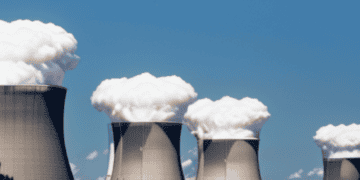The global electricity generation from nuclear energy has seen a 4% decrease in the past year compared to 2021. According to the annual World Nuclear Industry Status Report (WNISR), nuclear power’s contribution to total gross electricity generation has dropped to 9.2%, marking the lowest level since the 1980s. In 2022, nuclear energy produced 2,546 terawatt-hours (TWh) of electricity worldwide.
While nuclear energy is often touted as a low-carbon power source essential for achieving climate goals, the industry faces challenges. Many nuclear plants globally are nearing the end of their operational lifespan, and numerous new plants are experiencing construction delays.
The United States leads in nuclear power generation, closely followed by China. Despite a recent resurgence in interest due to the search for low-carbon energy sources, the WNISR report indicates significant hurdles for nuclear power. These include extended construction times, high costs, and minimal climate impact reduction, rendering its contribution to climate solutions nearly negligible.
As of mid-2023, there were 407 operational reactors across 32 countries, a decrease from the previous year and significantly lower than the 2002 peak of 438 reactors. The report also highlights that the average age of nuclear reactors has increased to 31.4 years.
Currently, 58 reactors, which will add 58.6 gigawatts (GW) of capacity, are under construction. Most of these are in Asia or Eastern Europe, and over half face substantial delays. The report also notes that nuclear power is lagging behind renewable energy sources in terms of cost-effectiveness. The lifetime cost of building and operating a nuclear plant, compared to its total output, is almost four times higher than that of onshore wind power.
Your go-to for supply chain report news updates: The Supply Chain Report. For international trade tools, see ADAMftd.com.
#NuclearEnergy #ElectricityGeneration #ClimateGoals #WorldNuclearIndustry #WNISR #LowCarbonPower #NuclearChallenges #OperationalLifespan #EnergyTransition #RenewableEnergy #NuclearPower #AsiaEnergy #EasternEurope #SustainableFuture #EnergyCost #TerawattHours #Gigawatts















